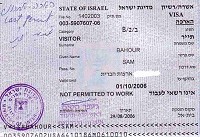Visa crisis unresolved for the 45,000 foreign nationals in the occupied Palestinian territories
January 16, 2007
Ma'an - Thousands of foreign passport-holders residing in the occupied Palestinian territory still risk falling victim to Israel's "abitrary, abusive and internationally unlawful" practices despite reported changes to Israel's policy of denying entry to foreigners en route to the Palestinian territories.
According to the Campaign for the Right of Entry/Re-Entry to the occupied Palestinian territory (oPt) in a press conference held on Tuesday in the West Bank city of Ramallah, Israel's proposed changes are being dealt with on a "case-by-case" basis, leaving thousands of foreign citizens at risk of expulsion. There are 45,000 foreign nationals residing in the oPt who face such restrictions, the campaigners say, and the vast majority of these cases would leave behind spouses, children, businesses and property.
In December, the Israeli Coordinator of Government Activities in the Territories (COGAT), Maj. Gen. Yossef Mishlev, announced to Palestinian chief negotiator Saeb Erekat that "the policy regarding entry of foreign nationals from countries maintaining diplomatic relations with Israel has changed, and entry of these foreign nationals into the West Bank is now possible".
The change in policy added that "Entry of aformentioned nationals will be permitted through means of the military commander's consent". In addition, the order states that "The 'last permit' stamp has been cancelled. People who have this stamp on their passport may leave the area, and their return will not be preventled solely on the basis of this stamp".
As a result, many foreign nationals who had previously encountered problems on Israel's borders, such as receiving 'last permit' stamps on their passports, decided to take the risk and attempt to renew their tourist visas by leaving Israel and returning. Fadah Thum, a Brazilian citizen married to a Palestinian and the mother of a five-month-old baby, is one example. Fadah had been renewing her visa every three months since 2001 when she came to reside in the West Bank. Then in September 2006, like hundreds of others, she received a 'last permit' and, in December, she was forced to leave behind her home, husband, baby and university studies. Following COGAT's announcement, she tried to re-enter and was denied entry.
The Campaign for the Right of Entry/Re-Entry said that another 13 or 14 similar cases of denial of (re-)entry have been reported to them in the last week alone. Many of these foreign nationals continue to be held at the detention facility in Ben Gurion Airport in Tel Aviv awaiting a decision. Included amongst these foreign detainees were a couple in their sixties, who arrived on 10 January and who were forcibly deported to Amman after six days' imprisonment. To add insult to injury, all such deportees have to personally bear the cost of their return to their country of nationality.
According to widely distributed consular information, a contact person from COGAT was stationed at the Allenby Bridge crossing between Jordan and the West Bank in mid-December, and another was expected to be stationed at Ben Gurion "within weeks" in order to prevent such problems at crossing points. However, the Campaign for the Right of Entry/Re-Entry informed that no such agents appear to be in place.
In addition, there are clearly no procedures in place for the thousands of foreign nationals who have chosen to make the Palestinian territories their home and 'centre of life'. There are 120,000 families in the occupied Palestinian territory whose applications for 'family reunification' since 2000 have been ignored by the Israeli authorities. These foreign nationals face a constant threat of expulsion, deportation and forced separation from their families and livelihoods.
There are also many whose details have gone astray in the depths of the Palestinian and Israeli bureacracies. Subha Ghanam is a US citizen. Her husband, Samer, is a Palestinian ID holder. They married in April 2006 and since then, they have resided together in the West Bank city of Ramallah. Subha is expecting their first child, a daughter, in March. In November 2006, Subha applied to the Palestinian ministry of interior for an extension to her visa. Since then, she has heard nothing about her application or her passport. She is now forced to remain within the West Bank with no papers as, if she leaves, she will likely be denied re-entry. Against her will, she has been forced to outstay her visa and, thus, violate Israeli law.
Subha told the press conference that this leaves her and her blossoming family with a "sense of instability and an unpredictable future"
The campaigners said Subha's is just one of over 150 similar reported cases. In accordance with Israel's stated instructions, some further 150 foreign passports have also been submitted to the Israeli interior ministry representative at Beit El since October and nothing has been heard of their applications or documents since.
The campaigners stressed, however, that this number represents just a fraction of the problem as many are too afraid of punitive measures by the Israeli authorities – such as deliberate denial of re-entry or visa extension – to report their case.
Charles Shubash, a legal advisor to the campaign, explained that the central issue is that Israel is not the sovereign power in the occupied Palestinian territories and thus, only international humanitarian and human rights law can be considered the point of reference in the territories. As a result, Israel does not have the legal right to do as it pleases with the population of this territory.
The crisis clearly remains unresolved.















0 Comments:
Post a Comment
<< Home